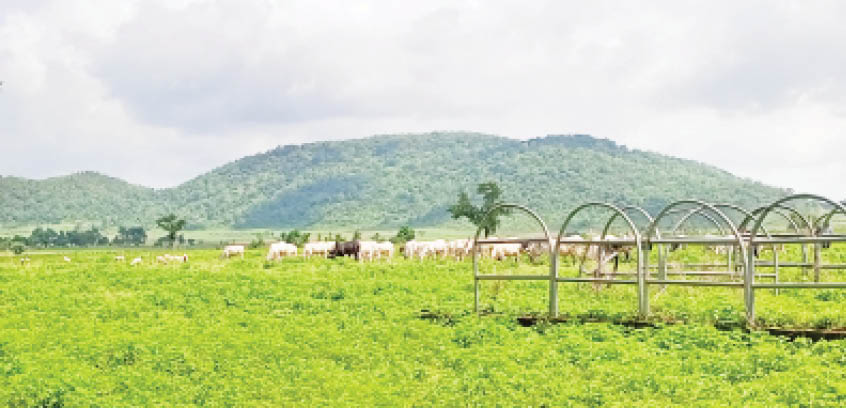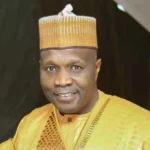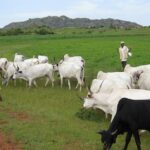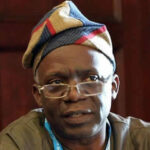The Paikon Kore Grazing Reserve in the Gwagwalada Area Council of the Federal Capital Territory (FCT) is one of the gazetted reserves in Nigeria.
The federal government chose the reserve to flag off its National Pasture Development Programme (NAPDEP) designed to allow livestock farmers across the country to develop farmstead pasture, including commercial pasture seed plots.
Buhari welcomes first ship at Lekki Deep Sea Port
10 FCT health workers honoured for outstanding performance
The objective was to create a culture of growing quality pasture for livestock along the fodder value chain as one of the solutions to the lingering clashes between crop and livestock farmers.
The federal government believes that due to competitive land use, increased pasture and fodder production to meet the industry need require development of sown pastures sustained with good management practices.
On Tuesday, the Minister of Agriculture and Rural Development, Dr Mohammad Mahmood Abubakar flagged off the NAPDEP at the reserve and announced that every 28th day of June each year would be a pasture planting day in the country.
The minister gave reasons for the federal government’s programme on pasture thus: “More than 95 per cent of Nigeria’s ruminant production is primarily managed under the traditional pastoral system characteristic of extensive system, where naturally grown pastures are the main source of nutrition for the animals. Therefore, herders and husbanders rely on mobility in search of feeds, water and friendly grazing areas; thus, the production system limits both production and productivity per animal, essentially due to lack of all-year-round availability of feeding and watering resources, thereby causing a drawback to the ability of the pastoralists to settle in a given place and produce.

“The result of this continuous movement in search of pasture has adversely affected the animals’ attainment of their optimal productivity and consistently impaired our national capacity for self-sufficiency in livestock products and animal protein needs, especially our national target of 1.6 billion litres of milk per annum.
“It has eluded our national peace-building efforts through incessant conflicts between pastoralists and crop farmers along their movement routes. These have also impaired improvement in the livelihood of the pastoral families in particular and neighbouring crop farmers.”
The Emir of Muri in Taraba State and chairman, Board of Trustees of the National Association for Pasture and Livestock Feeds Producers, Processors and Marketers of Nigeria, Alhaji Abbas Tafida, who has major investment on pasture production, gave a graphic picture of the economic benefit of pasture as a key element of eradicating poverty and solving tension among communities.
Pasture, he said, was at the centre of the livestock industry, “both left and right.”
“I will like to personally invite all my Fulani brothers and the minister to Gora to see a pasture established on behalf of one of the ministers of the Federal Republic of Nigeria. From that pasture, the person spent only N7 million to develop the pasture. We are cutting, bagging and selling it. We are even ready for export.
“From Abuja to Kano, we are sending three trailers of pasture at N2m each every week. So, from an investment of N10m, that person can earn that same amount every six days because you can cut the pasture four times.
“The pasture was developed in Brazil from our own andropogan grass (the most common grass gamba). Unfortunately, I was invited suddenly. I should have arranged the bags for my Fulani brothers to see and understand,” Alhaji Abbas said.
The Emir of Muri stressed that pasture should be at the heart of the Ministry of Agriculture because “it does three things: produces grass for the animals, part of the grass goes back to the soil to create fertiliser, the animals create organic fertiliser to sustain rice farming and everything else.
“These things must be done correctly today because that is what will build the future for the country.
“The second element is an analysis I understood many years ago—Nigeria is divided into three: the southern area that has a lot of water but has no land, the Middle Belt, symbolised by Abuja, which has both land and water, and the far North that has a lot of land but does not have enough water. So, the future of Nigeria lies in developing the grass in the Middle Belt and selling it to the South that doesn’t have land and the North that doesn’t have water. With that, we would eliminate all language of conflicts.
“Let’s turn the pasture into an economic element that is beneficial. For those who own the land and water, we encourage them to produce the grass and sell to those who do not own land and those who own land but have no water. At the end of the day, we are building the economy of Nigeria,” he said.
The director-general of the National Agricultural Seeds Council (NASC), Dr Philip Olusegun Ojo, opined that there must be a sustenance mechanism for scaling-up and scaling-out of the programme.
“The production of adequate quantities of high-quality pasture seeds that are available and accessible to pasture developers is very important,” he said.
He said the absence of seed system for forage and pasture crops to supply pasture and forage seeds to herdsmen to allow for more sedentary animal husbandry than the nomadic system was worrisome.
“The NASC, as part of its mandate, took up the challenge to develop the pasture and forage crops seed production and delivery system to facilitate continual supply of these crop seeds to animal farmers for establishment of ranches and paddocks,” he stated.
Key facilities at the reserve
The grazing reserve has been equipped with a sheep and goat training centre for small ruminants, milk collection centre, a stand-by power generating set, tractor, fodder production centre, planting lots for the cultivation of grass for the livestock, among other facilities.
Project misinterpreted
The Gbagyi farmers who live in the area felt the federal government decided to favour the herdsmen who are the Fulani, to the neglect of other sedentary farmers who live side-by-side in the community.
According to some of the leaders, the community has schools and clinic that are in shambles and have been abandoned or neglected for many years, but the federal government decided to show favouritism to the Fulani by developing the grazing reserve. This did not go down well with them.
They also said government failed to assist them with fertiliser and other inputs.
In addition, they want the reserve to be fenced as having pasture development will attract large herdsmen, which will threaten farms around the reserve.
However, a well developed pasture in the reserve would be a key solution to the problems facing herders and farmers in the country.
Stakeholders believe the federal government must also deliver assistance to the communities around the reserve to douse the rising tension.



